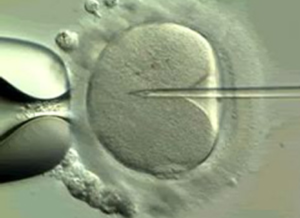Intra-cytoplasmic sperm injection (ICSI)
It is probably easiest to consider ICSI as an extension or addition to standard IVF treatment. Every aspect of treatment is the same as for IVF up to the point of egg collection. More information about IVF is available in the IVF Section.
The major difference is that instead of just mixing sperm and eggs together in a dish and hoping that fertilisation will take place, a single sperm is taken and injected directly into each egg, thereby maximising the possible chances of fertilisation taking place.
After fertilisation the eggs are cultured and graded and two or exceptionally, three are transferred into the womb as with IVF.
Who is suitable for ICSI?:
- Those patients whose eggs have not fertilised or have had poor fertilisation rates through standard IVF in a previous cycle:
Unfortunately it is not always possible to identify patients who are likely to suffer from failed fertilisation at IVF by using a Semen Analysis test. In most cases the reason for failure is not known. - Couples where the male partner has greatly reduced sperm quality or quantity:
For those men who have sperm which are of very poor quality an attempt at conventional IVF would be inappropriate as it would be highly unlikely to succeed. Before ICSI became available donor sperm or adoption would have been their only option.
Find out more about sperm quality on our Sperm Problems page.
- Couples where the male partner has a blockage or abnormality in the testes which prevents the sperm from appearing in the ejaculate:
Patients with a testicular blockage or abnormality, often in the vas-deferens (the tube which drains the sperm from the testicle), can have sperm drained through a needle directly from the testicles. ICSI is needed in these cases because the sperm are immature and unable to fertilise an egg.
Find out more about conditions affecting the testes that result in the absence of sperm on the Azoospermia page
